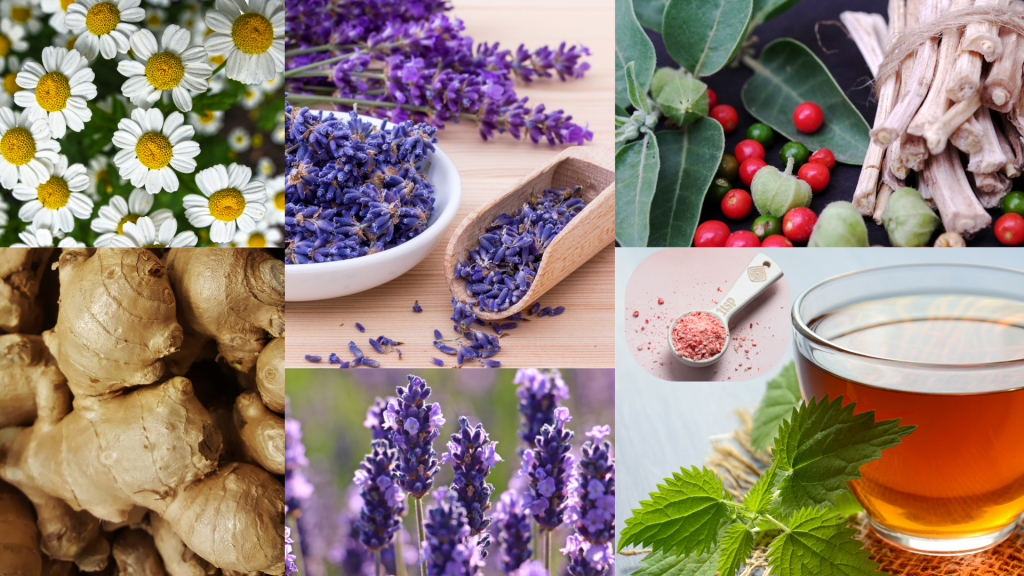OUTLINE
Herbal treatments have been utilized for ages to address common health issues safely and effectively. From alleviating headaches to relieving digestive troubles, various herbs offer gentle, natural remedies that can be seamlessly incorporated into everyday life. This article examines herbal treatments for three widespread concerns—headaches, digestive problems, and mild anxiety—introducing readers to accessible, evidence-supported herbs and outlining safe usage.
- Herbal Treatments for Headaches
Headaches rank among the most prevalent health complaints, and certain herbs are recognized for their alleviating effects:
- Peppermint: This well-known herb contains menthol, which provides a cooling sensation and helps to relax muscles. When applied topically as an essential oil, diluted peppermint can ease tension headaches. Massaging a few drops combined with a carrier oil onto the temples and forehead may relieve discomfort.
- Feverfew: Historically utilized for migraines, feverfew holds active compounds that diminish inflammation and assist in preventing the constriction of blood vessels, factors commonly linked to migraines. Feverfew can be consumed as a tea or in capsule form, particularly beneficial for those who experience frequent migraines.
- Ginger: Valued for its anti-inflammatory properties, ginger can help mitigate headache pain and lessen nausea associated with migraines. Steeping fresh ginger in hot water for tea or incorporating powdered ginger into smoothies or dishes offers a simple way to reap its benefits.
- Herbal Treatments for Digestive Issues
Digestive troubles, such as bloating, indigestion, or nausea, can often be soothed with certain herbs:
- Chamomile: Chamomile possesses anti-inflammatory and antispasmodic qualities, making it useful for calming the digestive system. A warm cup of chamomile tea following meals can facilitate digestion, alleviate bloating, and assist in relaxing intestinal muscles, thereby reducing discomfort.
- Peppermint: Alongside its headache-relieving properties, peppermint can help ease indigestion and gas. It relaxes the gastrointestinal tract, making it beneficial for conditions like irritable bowel syndrome (IBS). Peppermint tea or peppermint capsules are popular approaches for digestive relief.
- Ginger: Particularly effective against nausea, ginger shows promise in alleviating symptoms, especially during pregnancy or post-surgery. Ginger tea, prepared using fresh ginger root, or ginger supplements can aid in soothing nausea and enhancing digestion.
- Herbal Treatments for Mild Anxiety
Mild anxiety and stress are widespread, and various herbs provide natural calming effects without adverse side effects:
- Chamomile: Chamomile is a soothing herb frequently used for relaxation and mild anxiety relief. It is available as tea, capsules, or tinctures. Enjoying chamomile tea can help alleviate anxiety, foster relaxation, and enhance sleep quality due to its mild sedative properties.
- Ashwagandha: Recognized as an adaptogen, ashwagandha aids the body in managing stress by regulating cortisol levels. Commonly found in capsule or powdered form, it can be blended into smoothies. Ashwagandha is favored for its potential to ease anxiety and promote tranquility without inducing sleepiness.
- Lavender: The calming scent of lavender has long been leveraged to alleviate anxiety. Lavender essential oil can be utilized in diffusers, incorporated into bathwater, or applied topically (diluted in a carrier oil) for aromatherapy effects. Lavender tea also offers gentle relaxation and may diminish mild anxiety symptoms.

Preparation Methods: Teas, Tinctures, and Capsules
- Teas: Many herbs can be easily brewed into tea, which is a gentle and effective way to consume them. Use 1-2 teaspoons of dried herb per cup of hot water, steep for 5-10 minutes, and enjoy. Teas are excellent for soothing digestion, alleviating headaches, and calming nerves.
- Tinctures: Tinctures are potent liquid extracts created by soaking herbs in alcohol or glycerin. They are concentrated and can be mixed with water or juice. Tinctures offer a quick-acting remedy, particularly for anxiety and headaches.
- Capsules: Capsules provide a practical method to consume herbs without requiring any preparation. This is particularly beneficial for herbs such as feverfew, ashwagandha, and ginger. Capsules are suitable for individuals who prefer a consistent dosage or need something portable.
Considerations for Safety and Dosage
Though herbal remedies are typically safe, they should be utilized with care:
- Consult Healthcare Professionals: If you are pregnant, nursing, or taking other medications, it’s important to speak with a healthcare provider before using herbal treatments, as some herbs may interact with medications or may not be appropriate for specific conditions.
- Begin with Lower Doses: When trying a new herb for the first time, start with a small quantity to ensure there are no negative reactions. For teas, begin with a single cup; for capsules, adhere to the dosage recommendations on the label.
- Use Essential Oils Cautiously: Essential oils should not be taken internally unless prescribed by a healthcare provider. When using them on the skin, always dilute them with a carrier oil (such as coconut or almond oil) to prevent skin irritation.
- Limit Prolonged Use of Certain Herbs: Some herbs, including feverfew and ashwagandha, work best when taken for shorter durations. Adhering to suggested usage periods helps avert dependency and preserves their effectiveness.
Final Thoughts
Herbal remedies provide a natural, accessible option for addressing common issues such as headaches, digestive problems, and mild anxiety. Incorporating herbs like chamomile, peppermint, ginger, and lavender can enhance wellness and offer gentle relief. By knowing the best ways to prepare and the safety precautions to take, you can reap the benefits of these time-honored remedies and weave them into your self-care practices. With thoughtful use, herbal remedies can be a significant element of a comprehensive approach to health and well-being.

























